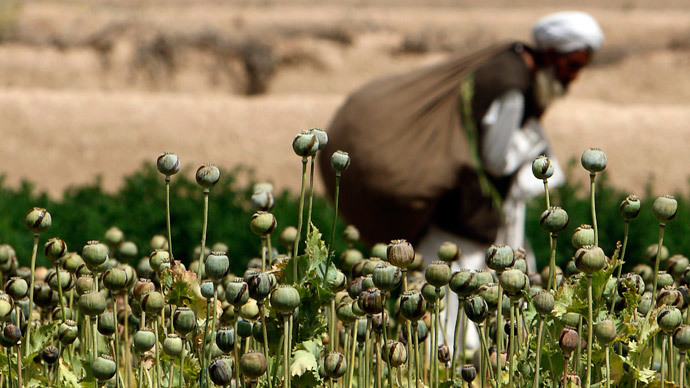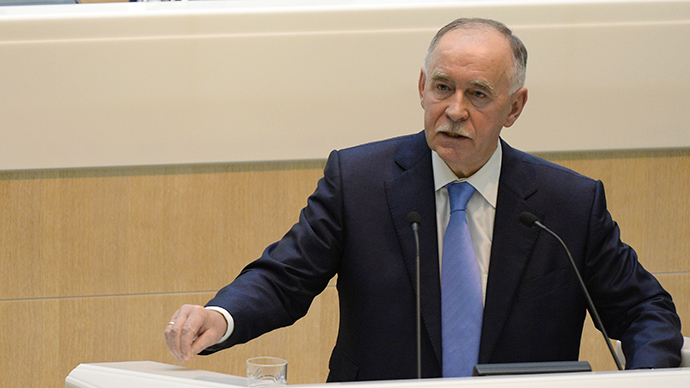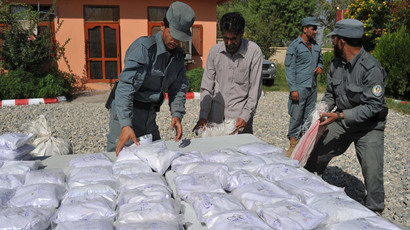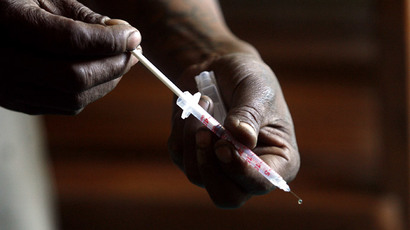Intl anti-narcotic office needed to combat Afghan heroin – Russia

Various programs aimed at resolving the problem of massive production of heroin in Afghanistan should be merged into an internationally-supervised office, suggests Russia's chief drug officer.
“We suggest the creation of an international headquarter or an office for combating the planetary center of drug production in Afghanistan. The goal of the HQ would be to consolidate the currently separate anti-narcotic programs in Afghanistan and to create an effective, internationally-supervised mechanism to eradicated drug production,” Viktor Ivanov, the head of Russian Federal Drug Control Service, told on Thursday a ministerial conference in Moscow.
He added that such a global effort should include not only direct attack on opium poppy field and drug trafficking, but also a large investment program for Afghanistan.
“Russia believes that the international community should organize a comprehensive development program for Afghanistan to be implemented between 2015 and 2025. It would be based on alternative development of the new generation and include forceful industrialization effort and basic infrastructure development,” he said.
“We see Afghanistan a strong a prosperous nation in the near future. We have to bet on development for it,” Ivanov said.

Heroine production was on the decline in Afghanistan under
Taliban rule, but skyrocketed since the US-led coalition invaded
the country. Over 200,000 hectares in Afghanistan are currently
used to grow opium poppies, according to the Special Inspector
General for Afghanistan Reconstruction.
“In 14 years since the start of the Enduring Freedom
operation, over a million people in Eurasia have died from Afghan
heroin, with at least half of them being Russian citizens,"
Ivanov said. "The intensive transit of drug products from
Afghanistan, which is estimated at over 100 billion dollars
annually, provides the basis for the spreading of paramilitary
drug gangs, the rise of violence and involvement of millions of
people in the region in the transit of the high-priced drug
products, which has deformed the political landscape of the
states in Central Asia, the Caucasus and the Middle East.”
But the impact of the Afghan heroin goes much further, affecting Europe, the US, African countries. The situation is aggravated by political turmoil, like the one underway in Ukraine, where the decline of law enforcement had resulted in increased heroin traffic lately.
“We have to admit an obvious and fundamental failure of the international effort, say honestly that it ended in a fiasco,” he stressed.
Russia on its part is working with the Afghan authorities to help them tackle the problem, Ivanov said. A joint raid on Wednesday resulted in five drug laboratories destroyed in Afghan province of Badakhshan, which produced more than 250 kg of heroin daily.
Since September 2010 the Russian-Afghan operations against drug gangs saw 24 laboratories dismantled, he added.
Speaking to journalists after the conference, Ivanov commented on the US sanctions targeting him and how they affect his job.
“I don't take offense at the sanctions; I believe them to be counterproductive and expect that common sense will eventually prevail,” he said.
“The US is a big strong country. There are politicians there who take not politically motivated decisions. There are also many professionals there. I have many acquaintances there and I hope my people will work on,” he added.
Ivanov was among the Russian officials banned from entering the US in a Washington bid to pressure Moscow to change its stance on Ukraine.
In his interview with RT, Afghanistan’s minister of counter
narcotics, Dim Muhammad Mobarez Rashedi, confirmed that the
cultivation of opium is currently on the rise in the country.
“The Afghan government is working in a number of ways to
tackle this issue,” he said. "We do need international
assistance and the assistance of the Russian Federation is
vitally important.”
The cultivation of opium “goes on in the regions where
there’s no control of the Afghan government,” the minister
stressed.
“In the areas where the Afghan government has control, we need to
generate more alternative livelihood projects for the people not
to grow poppy there,” he added.














